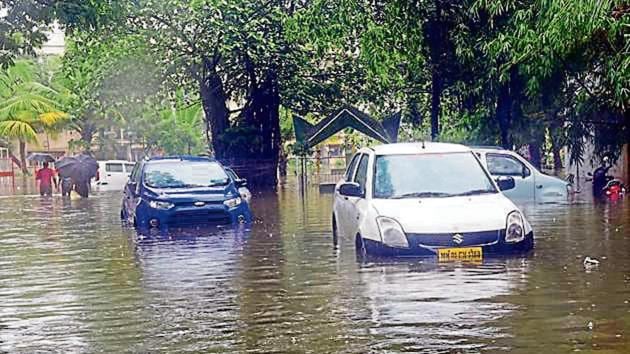Mumbai’s rain pains: We have not learnt any lessons, say experts
The government last month took its first step to open up salt pan lands by setting up a five-member committee to consider a proposal by a private developer to open such land in Kanjurmarg and Bhandup to build one lakh affordable homes.
In November last year the city’s new Development Plan (DP) 2034 came into force after a delay of four years. This crucial document that will dictate how Mumbai develops over the next two decades, however, doesn’t address one of the city’s most stark current and future challenge: Monsoon-related flooding. A joint exercise by the Mumbai civic body and the state government, the two authorities that have failed the city every monsoon since 26/7 deluge, the DP is a glaring example of the short-sightedness of our authorities.

The DP was drafted after our city planners and authorities witnessed the mayhem of 26/7 deluge and the yearly monsoon-led paralysis of the city since then. Not only does it not address climate change in any way, the DP instead opens gates for development on saltpan lands, the environment bulwark against floods.
The government last month took its first step to open up salt pan lands by setting up a five-member committee to consider a proposal by a private developer to open such land in Kanjurmarg and Bhandup to build one lakh affordable homes.
As the city went down under yet again on Monday late night, the one-time squabbling allies BJP and Shiv Sena found convergence in a quick defence on just why Mumbai got paralysed. Both Chief Minister Devendra Fadnavis and Shiv Sena youth wing president Aaditya Thackeray claimed that the Brimstowad project, envisaged as a panacea for tackling Mumbai’s flood woes after the 26/7 deluge, had capacity of draining out rain water at 50 mm per hour and could not tackle “unprecedented rains.” “Call this emergency or climate change but such a situation was never seen before. Any city of the world can crumble in such a heavy rainfall because this is nature’s fury,” said Thackeray.
Even keeping aside the fact that Brimstowad project remains incomplete after 14 years,this is an excuse that the authorities have given us quite routinely as they fail citizens. After 2005, in 2011 and again in 2017, “unprecedented rains” were blamed for the disaster.
“We have learnt nothing from disasters like the ones in New Orleans. Mumbai’s DP has not even demarcated flood plains. Instead of maintaining these as no-go areas of mangroves, wetlands and salt pan lands, we have constructed on them and plan to open them further. The BMC’s entire exercise of augmenting drains is an exercise in futility. Augmenting capacity of drains will work in cities with higher elevation and not for Mumbai, a city below the sea level. It may work during low tide but with high tide the sea water will push into the mainland,’’ said Stalin D, an environmentalist.
Urban planners also point to indiscriminate paving and cementing in the city as one of the major causes of floods as soil percolation is no longer possible. “There is almost no unpaved area in Mumbai, which means percolation of water in soil is not possible, increasing quantity of run-off water and adding to the stress on our storm water drains. We need to think of ways to avoid paving everywhere and protect environment,’’ said Rohit Shirke, architect and professor with Rachana Sansad, architecture and design college.
Beyond the long term vision, Monday’s late-night nightmare for commuters once again reveals the utter fiasco of BMC, the state and Railways disaster management plans. Like every year, hundreds of commuters were caught off guard and stranded late night when trains on the central line halted midway.
Despite weather forecasts, authorities could not even issue commuting warnings and alerts until it was too late and cars had to be stranded on the roads. And BMC’s evacuation plan to warn residents about waterlogging in their areas two hours in advance remained just on paper as colonies and homes got flooded.



